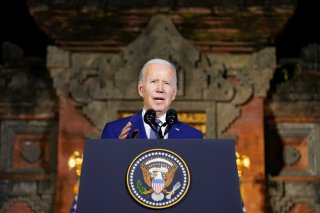Cyberspace: The New Battlefield of U.S.-China Competition
The road to an international digital order may be long and uncertain, but no meaningful progress can be made if the discourse about it is confined to the two great powers.
China’s growing cyber capabilities have allowed it to increase its influence in setting standards relevant to the design and operation of the future internet, and to promote an international digital order, which is interpreted by the West as serving China’s geopolitical goals. The U.S. government has developed a grand strategy based on “digital realpolitik,” with a primary objective of advancing U.S. cyber dominance and limiting its main digital adversary—China.
Great power competition in cyberspace is that it has increased the danger of decoupling in technological systems, and even in cyberspace itself, unless a consensus can be reached to build an international digital order.
A New Kind of Digital Divide
When we talked about the digital divide a decade ago, we referred to the gap between rich countries, where people had access to the internet through networked computers and smart devices, and poor countries, where people had less access. With the rapid penetration of low-cost smartphones (largely made by Chinese producers) in underdeveloped countries, this digital divide is shrinking. However, there has emerged another digital divide defined by cyber capability: countries with advanced cyber capabilities and countries with fewer capabilities.
The internet is an open network woven together by globally standardized data communication protocols and managed from the bottom up. Billions of users and digital devices interact, generating massive amounts of data. In other words, the internet is highly decentralized, and every user is equal in generating data.
In reality, however, not every actor is equal in cyberspace. Individuals, organizations, and governments that possess more advanced cyber capabilities make the rules, not just in technical standards but also in institutional regulations. Because of high switching costs, organizations and states enjoy a pre-emptive technology monopoly built upon path dependence if they are first or early movers in cyberspace.
For example, in 2021, the top five U.S.-based tech giants—Amazon, Alphabet, Microsoft, Apple, and Meta–Facebook—and the top five China-based giants—Huawei, ByteDance, Alibaba+Ant, Tencent, and Baidu—collectively controlled over 50 percent of online traffic and dominated the world’s digital infrastructure. In 2020, these five American tech giants invested over $120 billion in research and design, and the top five Chinese giants invested over $60 billion, accounting for 18 percent and 10 percent, respectively, of their countries’ total R&D expenditure. These figures are on par with or greater than the R&D investment of many industrial countries. Thus, these nonstate actors play a critical role in the standardization and shaping of the de facto digital order.
The advantages of these big firms are compounded by the fact that, in the tech world, innovation in technology and business models often outpaces the development of rules and regulations—and, indeed, the comprehension of policymakers. For this reason, the balance of power between states divided by cyber capabilities is inherently asymmetrical: countries with advanced cyber capabilities will dominate the technological frontier and the international digital order.
Does this asymmetry of power mean that countries with fewer cyber capabilities or fewer large tech firms must subordinate themselves to high-tech societies such as the United States and China in building an international digital order?
Implications for the Rest of Us
The road to an international digital order may be long and uncertain, but no meaningful progress can be made if the discourse about it is confined to the two great powers in cyberspace. Their interests may not be aligned with the rest of the world.
However, constrained by their limited cyber capabilities, most countries currently have little participation in, or influence over, this discourse.
In contrast to a world order that is determined by superpowers, data is globally distributed, meaning that any digital order should be inclusive of state and non-state actors, both large and small. Ultimately, we are all data generators and should benefit from the value derived from that data. Cyberspace, as a new arena for global activities, requires that all members, regardless of their strength, have a say in the making of an international digital order.
Dr. Marina Yue Zhang is an associate professor at the Australia-China Relations Institute, University of Technology Sydney (UTS: ACRI). Prior to this position, Marina worked for UNSW in Australia and Tsinghua University in China. Marina holds a bachelor’s degree in biological science from Peking University, an MBA and a PhD from Australian National University. She is the author of three books, including Demystifying China's Innovation Machine: Chaotic Order, co-authored with Mark Dodgson and David Gann (Oxford University Press, 2022). In addition to academic publications in technology and innovation, Marina also writes commentary pieces for news outlets, including in The Conversation and The Diplomat.
Image: Reuters

